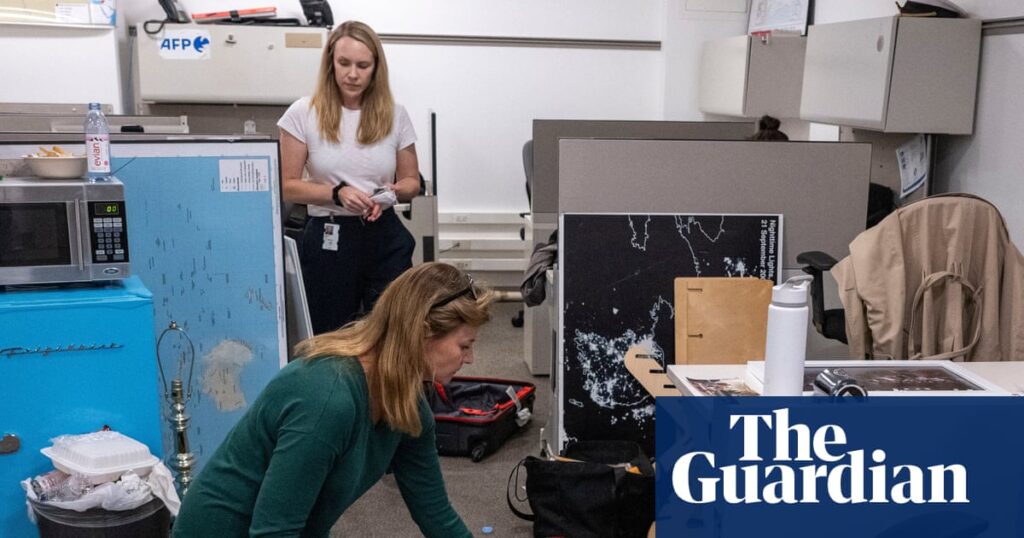
Pentagon reporters who refused to comply with a new set of policies, criticized by press advocates and news organizations as contrary to journalistic principles, were required to return their press badges by 5 PM on Wednesday. This marked the end of an era of extensive in-house coverage at the world’s largest military headquarters.
As the deadline loomed, journalists were seen hurriedly packing their workspaces in two media rooms, with hallways crowded with boxes, books, and memorabilia from decades of daily reporting. A seasoned Pentagon correspondent, speaking anonymously, shared with The Guardian that they opted to drive rather than take the subway due to the sheer volume of items they needed to transport.
The departure of these reporters raises questions about how they will continue to cover the Pentagon without the direct access they have long relied upon. Current and former Pentagon correspondents expressed concerns that coverage would suffer due to the lack of proximity to key decision-makers. However, many are determined to demonstrate that these restrictions will not impede their work, with some even planning to adopt a more aggressive approach.
Policy Changes and Their Impact
The new guidelines, introduced under the direction of Defense Secretary Pete Hegseth, a former Fox News host known for his critical stance on the media, have progressively reduced journalists’ access. This includes the eviction of some television networks from their dedicated workspaces and the closure of the briefing room used by many as a workaround.
The requirement for journalists to sign a comprehensive set of new guidelines, which restrict their reporting activities, is viewed as the most significant step in this direction. Many journalists were unwilling to agree to stringent rules on the “solicitation” of information from defense employees, citing ambiguous language that could hinder their ability to gather necessary information.
“We will continue to cover the U.S. military as each of our organizations has done for many decades, upholding the principles of a free and independent press,” pledged the country’s five major television networks in a joint statement.
Challenges and Adaptations
The veteran Pentagon correspondent expressed concerns that coverage would initially suffer, stating, “In the short and medium term, it’s going to reduce the number of probing stories we would have done.” However, they remained optimistic, adding, “Long term, I think we as reporters will figure out ways around it. I’m also sort of motivated as well, because once this happens, it’s like, I’m going to go really hard now and try to prove that we can do our jobs without being there.”
Reporters are particularly worried about delays in receiving responses to questions about rapidly developing situations. Previously, they could quickly seek clarification and comments from press officials. Now, they may have to rely on phone and email, potentially delaying critical information.
There is also concern about the potential reluctance of Pentagon officials to communicate, given that the new guidelines warn of “potentially severe consequences for disclosing non-public information without proper authorization,” including “criminal liability.”
“I do hope there are as many probing stories, but I think the chilling effect of Hegseth’s move isn’t just going to be limited to reporters; it’s going to have a chilling effect on officials as well,” noted another Pentagon correspondent.
Future Prospects and Reactions
Despite the challenges, some reporters remain hopeful about securing day passes for access to the building. When asked about the possibility of day passes for those who declined to sign the agreement, a Pentagon spokesperson responded, “We have nothing further to provide for you at the moment.”
The Atlantic, among other news organizations, declined to sign the new protocols. Griff Witte, managing editor overseeing national security and defense coverage at The Atlantic, emphasized the importance of having journalists in the building as representatives of the American public. “There’s a basic level of accountability and transparency that is important for the public; it’s important for the press; and it’s important for the military,” Witte stated.
Barbara Starr, a veteran CNN Pentagon correspondent, predicted that Hegseth might regret the reduced coverage resulting from the policy change. As of now, only the conservative One America News has openly agreed to sign the agreement and remain in the building. The Federalist has also indicated its willingness to sign, with editor Mollie Hemingway stating that the publication would cover the Pentagon “both on-site and from a distance.”
“The press corps will do everything it can to overcome all of this,” Starr asserted. “I think it’s going to fire up reporters to find ways and make sure they can still do their jobs, but it’s very sad business. The Pentagon press corps has traveled to every combat zone in the world. To be regarded as anything less than professional in their jobs is sad business.”
As the Pentagon press corps navigates these new challenges, the commitment to uphold journalistic integrity and continue robust coverage remains unwavering. The coming months will reveal how these seasoned reporters adapt to the evolving landscape and continue to deliver critical news to the public.







